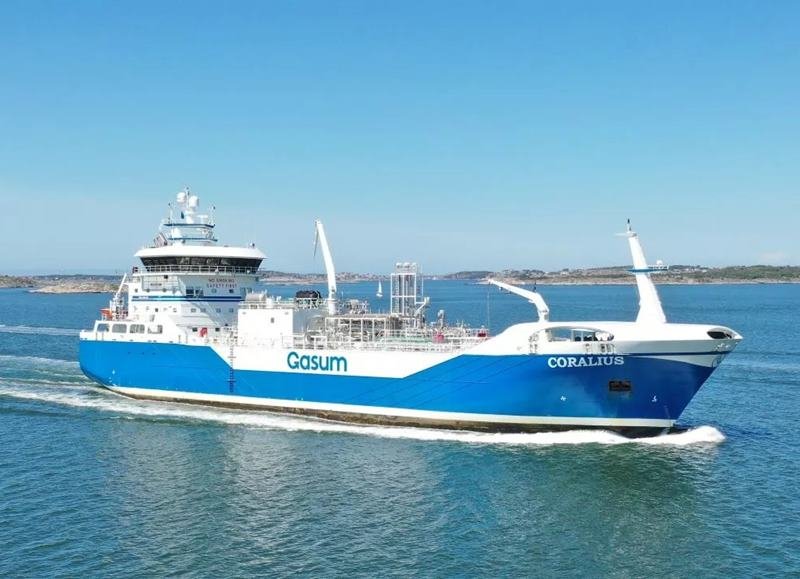Gasum’s LNG bunker vessel Coralius recently made its 500th bunkering of LNG in Gothenburg, Sweden. Over the last five years Coralius has safely and successfully bunkered 109,567 mt of LNG to a vast array of vessels – oil tankers, car carriers, shuttle tankers, dry cargo carriers, cruise ships, expedition vessels, ferries.
Coralius made its maiden bunkering in September 2017 and is owned by Anthony Veder and Sirius Shipping. At the time of commissioning, Coralius was the first of its kind, a purpose-built LNG bunker vessel.
The 1A Ice Classed Coralius was designed specifically to safely discharge large quantities of LNG to its receiving vessel in a short period of time. The flat working deck is especially engineered for safe side-by-side operations.
Coralius itself is completely powered by LNG. Compared to other marine fuels, LNG drastically cuts both sulphur oxide (SOx) and nitrogen oxide (NOx) emissions and lowers carbon dioxide (CO2) emissions which makes it currently the most viable alternative fuel for reducing emissions.
The LNG the Coralius has bunkered thus far has saved up to 50 000 mt CO2 when compared to the same amount of bunker oil (MGO) being used by vessels.
Table of Contents
Coralius facts
Length overall: 99.60 meters
Beam: 17.95 meters
Draft: 5.8 meters
LNG capacity: 5,800 m³
Service speed: 13.5 knots
Owner: Sirius Shipping and Anthony Veder
The cleanest marine fuel available
If we are to fight climate change, emissions from the use of conventional fuels such as heavy fuel oil in maritime transport need to be reduced. Rapidly becoming more common as a cost-effective alternative, liquefied natural gas (LNG) is the cleanest marine fuel available. Compared with heavy fuel oil, LNG has significantly lower CO2 emissions, and almost nonexistent particle emissions.
LNG is a safe and proven technology that offers higher energy content and lower operational and maintenance costs. It is suitable for all vessel types, including ferries, passenger ships, tankers, bulk carriers, supply and containerships.
As a premium provider of LNG, Gasum is a trustworthy partner for both experienced buyers and for customers that are switching from conventional fuels to LNG. Our wide variety of sustainable yet efficient services and solutions support our customers in optimising their operations for a more sustainable future.
Decarbonization of the maritime industry
Maritime traffic generates 3 percent of the world’s total greenhouse gas emissions such as carbon dioxide. This contributes to global warming and extreme weather conditions. CO2 is emitted by ships using petroleum-based fuels to power main and auxiliary engines. Through the International Maritime Organization (IMO) the world’s shipping industry is constantly working to reduce CO2 emissions.
LNG as a marine fuel meets all the current and forthcoming IMO and EU regulations. Switching to LNG means complete removal of Sox and particles, and reduction of Nox emissions of up to 85 percent. LNG reduces CO2 emissions by at least 20 percent.
As a fuel, LNG is interchangeable with renewable LBG (liquefied biogas), as they both consist mainly of methane. This means that the two gases can be mixed. Using both LNG and LBG is one of the concrete actions that will take us towards a low-carbon society of the future.
As a premium provider of LNG and LBG, Gasum is an excellent partner for frontrunners in LNG propulsion who aim to optimise their efficiency and are constantly looking for better and more sustainable ways to operate. Part of our wide variety of services and solutions is ship to ship bunkering, operated since 2017 with our LNG bunker vessel Coralius. Having performed hundreds of safe bunker operations both at sea and in port, Coralius provides a flexible and responsive service for operators in the marine market.
Media & Press Release Gasum Ltd

